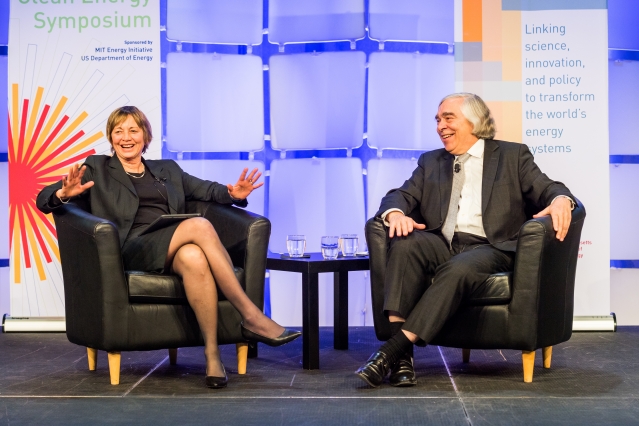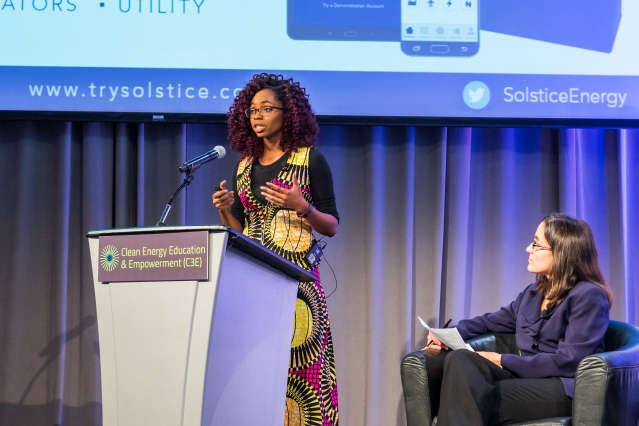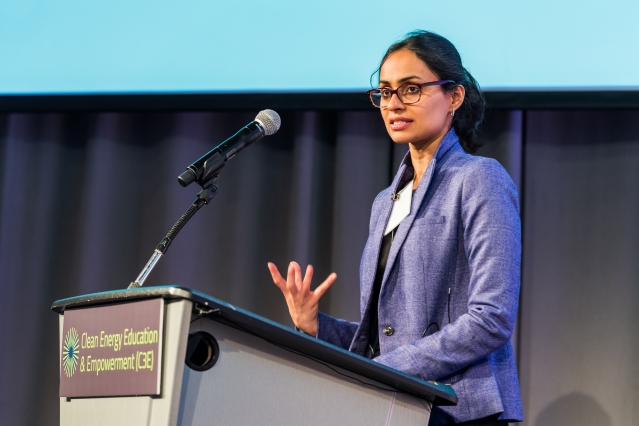
The diverse group of energy leaders who spoke at the 2017 Clean Energy, Education, and Empowerment (C3E) Women in Clean Energy Symposium hailed from different professional, personal, and political backgrounds, bringing many viewpoints on the conference’s theme of transforming energy infrastructure — nationally and internationally — for a transition to a low-carbon future. Though opinions on the best strategies to bring about this transition differed, all agreed on the urgency of deploying strategies and technologies to achieve it.
“It’s inspiring to be surrounded by so many women at different stages of their careers, approaching clean energy issues from a wide range of perspectives and professions,” MIT Energy Initiative (MITEI) executive director Martha Broad told the audience, which included industry professionals, government officials, and academic researchers, as well as students who were giving poster presentations. “MITEI is thrilled to host this event, celebrate our awardees, and hear from thought leaders in this space.” Broad is also a U.S. C3E ambassador — part of a cohort of senior leaders in business, government, and academia who serve as role models and advocates for women in clean energy.
Now in its sixth year being held at MIT, the C3E Symposium brings women at all stages of their careers together to discuss solutions to the most pressing energy issues of the day and to celebrate awardees from various disciplines. Founded under the auspices of the 25-government Clean Energy Ministerial, the U.S. C3E Initiative aims to advance clean energy by helping to close the gender gap and enabling the full participation of women in the clean energy sector. MITEI and the U.S. Department of Energy (DOE) have collaborated on the symposium since 2012, and the Stanford Precourt Institute for Energy joined the collaboration in 2016.
Inclusive clean energy solutions for the future
Panels throughout the two-day conference focused on strategies across the technology, policy, and business spheres to address energy challenges both local and global. Nevada State Senator Pat Spearman stressed the importance of forward-looking governance on a panel about innovative policies. For Spearman, innovation means taking advantage of Nevada’s natural energy resources, from an abundance of solar energy in the south to the potential for geothermal in the north. It also means developing progressive policies that facilitate timely regulatory changes in response to new and emerging technologies.
Spearman is particularly determined to account for low-income constituents with provisions in energy policy measures.
“We need to always include the fact that those who are on the lower spectrum of the income level are usually the ones who are the least likely to adopt because the price has not come down far enough,” she said. ”So those who can afford it do, and those who can’t, don’t. For me, it’s a matter of environmental and economic justice.”

Panelist Ugwem Eneyo, co-founder of Solstice Energy Solutions, spoke on a panel about emerging clean energy technologies.
On a panel about the future of the electric grid, Marcy Reed, National Grid’s chief of business operations, expanded on the importance of being mindful of customers’ needs.
“We have 20th-century infrastructure operating in a world with 21st-century demands,” she said, adding that at Massachusetts-based National Grid, and her colleagues take their cue on how to best affect change from their customers. “They’re savvy and passionate and environmentally-minded. They also want their energy delivery system to be modern and responsive to their needs.” She added that having the right tools and information enables customers to make energy-efficient choices.
Ugwem Eneyo, a Stanford University graduate and co-founder of Solstice Energy Solutions, explained how data are similarly important to her customers in sub-Saharan Africa.
“With the development and integration of solar and storage into the energy mix, data and connectivity will play a significant role in enabling future distributed energy grids, and will also play a significant role in driving efficiency and productivity of these distributed energy assets,” Eneyo said. Her company’s technology uses a data-driven approach to intelligently manage distributed energy, helping consumers plan for their own cost- and energy-efficient power use.
As a panelist for a session on international energy infrastructure developments, Radhika Khosla discussed ongoing changes in India’s energy system.

Radhika Khosla, a visiting scientist at the MIT Energy Initiative, spoke on a panel concerning international energy infrastructure developments.
“Not only is India a very large emitter, but it is also one of the most vulnerable countries to climate change,” said Khosla, who is a visiting scientist at the MIT Tata Center for Technology and Design. Citing rising temperatures, impending infrastructure and demographic transitions, and increased air pollution as a few among several factors, Khosla added, “What happens to India in terms of its growth trajectory matters not only in the global context, but also in the Indian context.”
Leveraging women’s expertise for the clean energy transition
Underscoring the bipartisan message of the importance of women’s involvement in the clean energy transition, U.S. Secretary of Energy Rick Perry gave a video keynote address in which he noted the positive effect that gatherings like the C3E Symposium can have in trying to address current energy challenges.
“Each of you here today helps advance innovation, connect new ideas with existing markets, and use technology to promote clean energy solutions,” Perry said. “But even more importantly, your work will inspire the next generation of women leaders in STEM, and that is sorely needed.”
Secretary Perry’s predecessor under President Obama, Ernest Moniz, engaged in a fireside chat with MIT Vice President for Research Maria T. Zuber, the E. A. Griswold Professor of Geophysics. Zuber and Moniz, who is the Cecil and Ida Green Professor of Physics and Engineering Systems Emeritus and special advisor to the MIT president, discussed the need for a rapid transition to a low-carbon economy and also highlighted the significance of initiatives like C3E in the mission to support and increase women’s involvement in STEM fields.
“If you can see it, you can be it”
Every year, C3E honors mid-career women who have made particular contributions to their area of energy and invites previous awardees to attend the conference. This year’s award-winners were: Anna Bautista, vice president of construction and workforce development for Grid Alternatives (Advocacy Award); Leslie Marshall, corporate energy engineering lead for General Mills (Business Award); Nicole Lautze, associate faculty member at the University of Hawaii Manoa and founder of the Hawaii Groundwater and Geothermal Resources Center (Education Award); Emily Kirsch, founder and CEO of intelligent energy incubator Powerhouse (Entrepreneurship Award); Chris LaFleur, program lead for Hydrogen Safety, Codes, and Standards at Sandia National Laboratories (Government Award); Allison Archambault, president of EarthSpark International (International Award); Sarah Valdovinos, co-founder of Walden Green Energy (Law and Finance Award); and Inês M.L. Azevedo, principal investigator and co-director for the Climate and Energy Decision-Making Center at Carnegie Mellon University (Research Award).
Senators Lisa Murkowski (R-Alaska) and Maria Cantwell (D-Washington) were co-recipients of the C3E Lifetime Achievement award for their work on energy issues, including their leadership roles on the Senate Energy and Natural Resources Committee and their stewardship of the bipartisan Energy and Natural Resources Act of 2017.
In her prerecorded remarks, Murkowski said “We all recognize [that] women bring a different perspective to problem-solving, so it’s imperative, whether in your fields or mine, if we want to find the best and most innovative solutions to our biggest challenges, the female perspective must be present and active at the decision table.”
Cantwell, in written remarks delivered by C3E Ambassador Melanie Kenderdine, said, “I am proud to work alongside you as we continue to celebrate the women who are making incredible achievements in clean energy.”
Carol Battershell, principal deputy director of the DOE’s Office of Energy Policy and Systems Analysis and a U.S. C3E ambassador, noted how meaningful it was for the C3E ambassadors to have the honor of choosing the awardees. Several other speakers also remarked on how it felt to be in the presence of a group of such impactful leaders and diverse practitioners in the clean energy sector.
Sherina Maye Edwards, energy commissioner for the Illinois Commerce Commission, prefaced her comments by saying, “So often, I am on the road talking to rooms full of people who look nothing like me. It is so nice to see not just such a fantastic group of women, but also such a diverse group of women.”
Awardee Emily Kirsch, who attended the first C3E conference in 2013, met many C3E ambassadors there who mentored and encouraged her while she was launching her company. Accepting the Entrepreneurship Award, Kirsch said, “C3E is a testament to the idea that if you can see it, you can be it.”